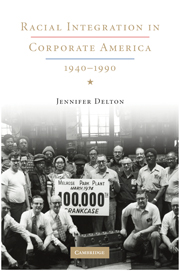Book contents
- Frontmatter
- Contents
- List of Tables
- Introduction
- PART I COLOR-BLIND GROUNDWORK, 1940–1961
- 1 The African American Struggle for Jobs
- 2 Fair Employment Is Good Business
- 3 Racial Liberalism and the Mid-Twentieth-Century Businessman
- 4 Human Relations in Management
- 5 Human Relations at International Harvester and Pitney-Bowes
- PART II COLOR-CONSCIOUS ASCENDANCY, 1961–1990
- Epilogue: From Affirmative Action to Diversity
- Statistical Tables
- Bibliography
- Acknowledgments
- Index
- References
5 - Human Relations at International Harvester and Pitney-Bowes
Published online by Cambridge University Press: 05 June 2012
- Frontmatter
- Contents
- List of Tables
- Introduction
- PART I COLOR-BLIND GROUNDWORK, 1940–1961
- 1 The African American Struggle for Jobs
- 2 Fair Employment Is Good Business
- 3 Racial Liberalism and the Mid-Twentieth-Century Businessman
- 4 Human Relations in Management
- 5 Human Relations at International Harvester and Pitney-Bowes
- PART II COLOR-CONSCIOUS ASCENDANCY, 1961–1990
- Epilogue: From Affirmative Action to Diversity
- Statistical Tables
- Bibliography
- Acknowledgments
- Index
- References
Summary
But industrial relations – like international relations – happen to be much less a problem of setting up a smoothly functioning organization than a problem of accommodating diverse and conflicting interests.
Daniel BellCentral to the human relations perspective was the belief that workplace environments and interactions could be influenced and changed, that good management had the power to engineer good human relations between and among groups. Racial integration would challenge this belief, and as it turned out, few industrial relations officers were up to the challenge. But in those “pioneering” companies committed to a fair employment policy, committed industrial relations officers made it happen. This chapter will examine the fair employment policies of two corporations: International Harvester, a Chicago-based manufacturer of farm equipment and trucks, and Pitney-Bowes, a medium-sized manufacturer of postage machines. By the mid-1950s, these two companies were well known as pioneers in fair employment and integration, in large part because their respective vice-presidents of industrial relations, Ivan L. Willis and Joseph Morrow, had publicized their company's success with fair employment in order that others might emulate it. Both companies also had highly developed human relations philosophies and programs, which went hand in hand with their struggles to contain unionism. In addition to demonstrating the mutually reinforcing relationship between fair employment and labor-stabilizing human relations programs, an examination of these companies also reveals the degree to which effective fair employment policies paid attention to race and color.
- Type
- Chapter
- Information
- Racial Integration in Corporate America, 1940–1990 , pp. 130 - 160Publisher: Cambridge University PressPrint publication year: 2009



